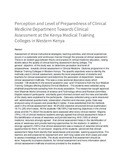| dc.contributor.author | Bitonye, Jacinta | |
| dc.contributor.author | Mengich, Gladys | |
| dc.contributor.author | Chemjor, Harun | |
| dc.date.accessioned | 2023-01-10T05:45:21Z | |
| dc.date.available | 2023-01-10T05:45:21Z | |
| dc.date.issued | 2022-11-09 | |
| dc.identifier.uri | https://doi.org/10.24018/ejmed.2022.4.6.1509 | |
| dc.identifier.uri | https://ej-med.org/index.php/ejmed/article/view/1509 | |
| dc.identifier.uri | http://ir-library.mmust.ac.ke:8080/xmlui/handle/123456789/2147 | |
| dc.description.abstract | Assessment of clinical instructional strategies, learning activities, and clinical experiences occurs in a systematic and continuous manner through the process of clinical assessment. There is an evident gap between theory and practice in clinical medicine education, raising doubts about the quality of clinical learning assessment during college. The general objective of the study was to determine perception and level of preparedness towards clinical assessment in Clinical Medicine Diploma programme in the Medical Training Colleges in Western Kenya. The specific objectives were to identify the methods used in clinical assessment, assess the level preparedness of students and teachers for clinical assessment and determine the perception of department towards clinical assessment methods. This was a cross sectional descriptive study which included 138 students in the second academic year and 10 lecturers from the four Medical Training Colleges offering Diploma Clinical Medicine . The students were selected using stratified proportionate sampling from the study population. The researcher sought approval from Masinde Muliro University of science and Technology ethics and Review committee. Eligible research participants voluntarily gave informed consent and the risks and benefits of the study were explained to the participants. Data was collected using a semi structured self -administered questionnaire, observation checklist and interview guide. Data was analyzed using chi-square and presented in tables .It was established that the methods used in the clinical assessment were 40.6%(56) objective structured clinical examination; 18.1% (25) short cases. All the students 138(100%) had learning objectives in the clinical areas and 66.7% (92)of the students were assessed after every clinical rotation Majority (79%) (10) of clinical medicine students strongly agreed that clinical assessment helps in the identification of areas of weakness and provide learning. All 6 (100) of clinical medicine lecturers strongly agreed that clinical assessment helps in the identification of areas of weakness and provide learning opportunities for the students .In addition, it strongly agreed 6 (100%) that clinical assessment was a measure of essential clinical skills opportunities for them. In conclusion majority of the students perceived that clinical assessment helps them identify their weaknesses and provides learning opportunities. The learners are well prepared for assessment and both long cases and short cases are used to assess knowledge and skills .The study recommends that assessment should be done frequently to prepare students for clinical assessment and more information about clinical assessment methods should be provided to the students. | en_US |
| dc.language.iso | en | en_US |
| dc.publisher | European Journal of Medical and Health Sciences | en_US |
| dc.subject | Perception, Level of Preparedness, Clinical Medicine, Department, Clinical Assessment, Medical Training Colleges | en_US |
| dc.title | Perception and Level of Preparedness of Clinical Medicine Department Towards Clinical Assessment at the Kenya Medical Training Colleges in Western Kenya | en_US |
| dc.type | Article | en_US |

